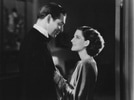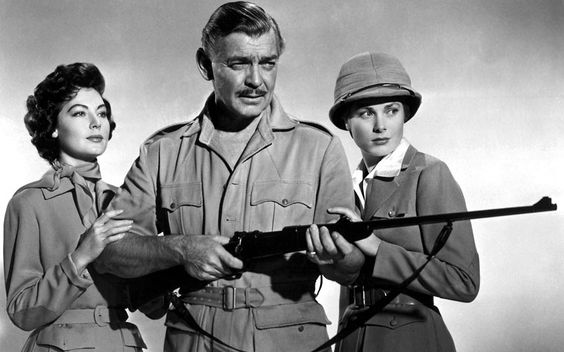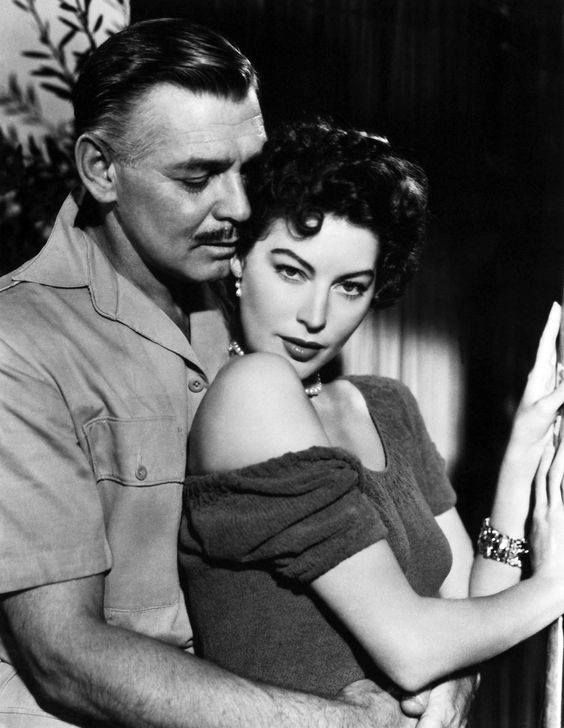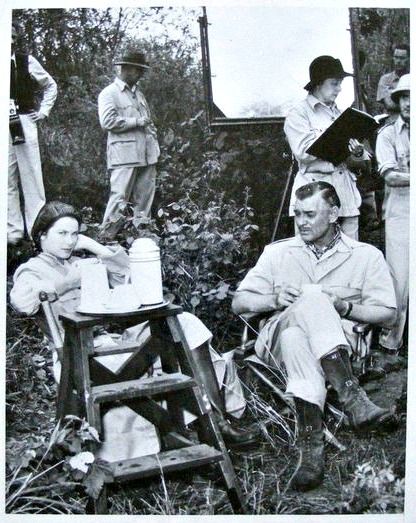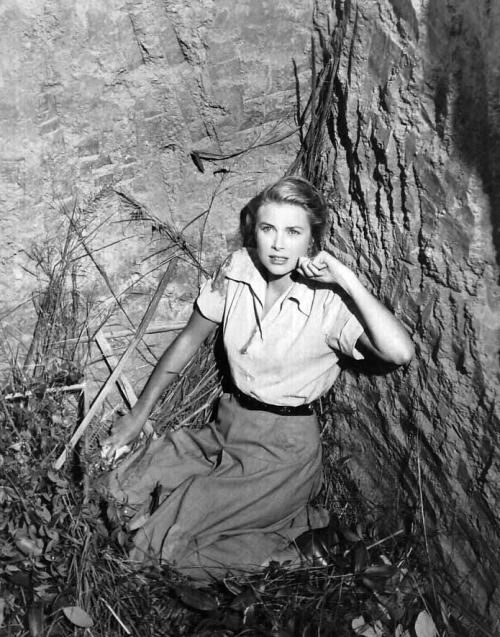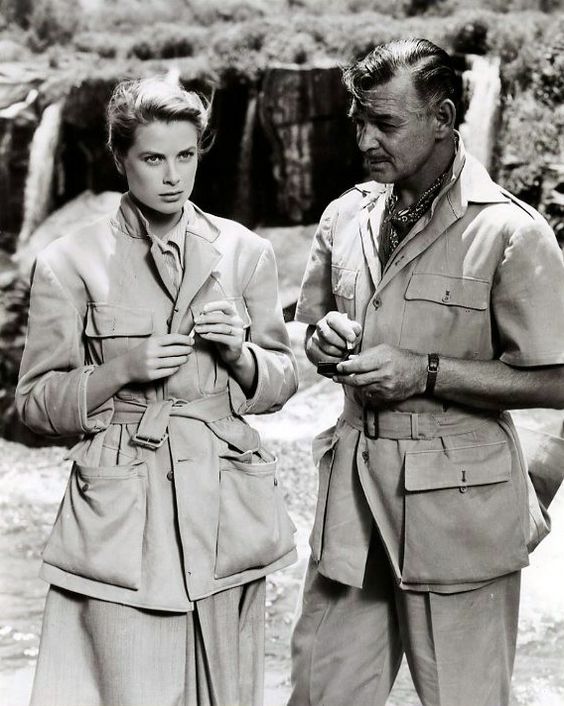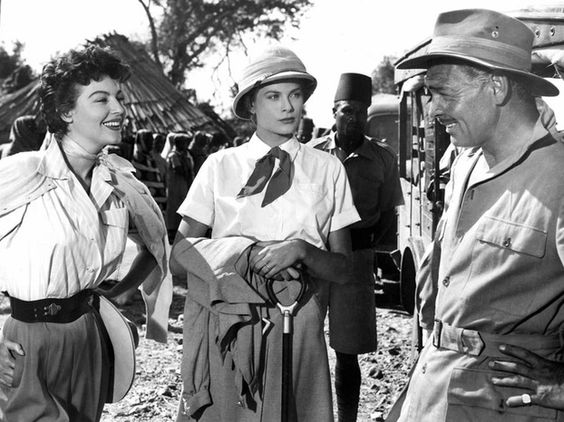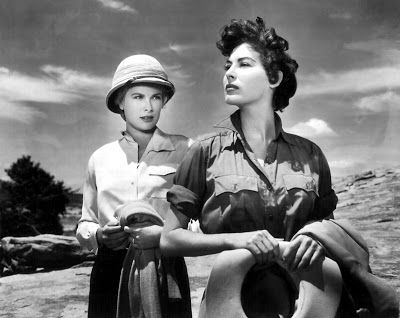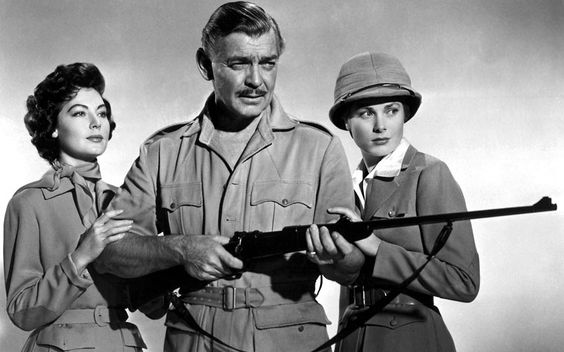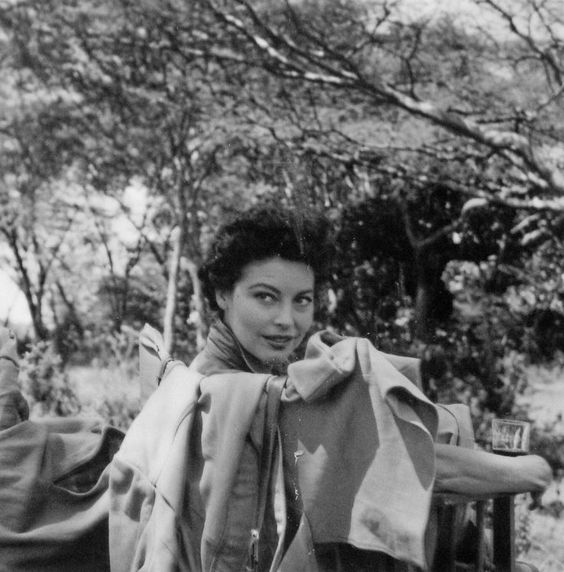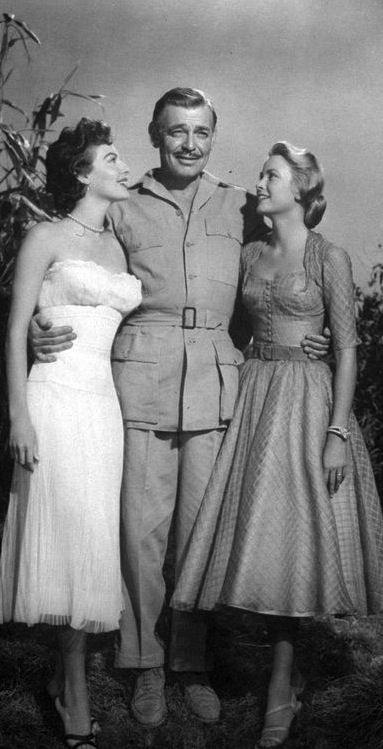Plot: A broad remake of the 1932 classic Red Dust (MGM w/ Gable, Jean Harlow & Mary Astor & directed by Victor Fleming), Mogambo tells the story of a safari owner (Gable) who must choose between 2 equally beautiful women who circumstance brings into his compound. Eloise Kelly (Gardner) is a ‘playgirl’ who has been stood up by a prince & Linda Nordley (Kelly) is the sheltered wife of naive anthropologist Donald Nordley (Sinden), who has come to photograph gorillas. Multiple love triangles ensue as animal magnetism confronts propriety.
Thoughts:
Using only the broadest strokes of Red Dust, a film he reportedly never saw, Ford crafts an overall pedestrian movie that is made memorable by the performances of the 3 main characters. In Red Dust the arguable center of the film was the Gable character, but here it is Gardner’s character, which has been softened from the prostitute Harlow played to a ‘playgirl’ chasing a rich prince half way around the world. That the shift was to one of the women, in a Ford movie, is interesting in and of itself, but shows the strength of Gardner’s performance and not a weakness in Gable’s. Gardner’s first appearance is a sly nod to Red Dust’s famous water tank scene with Harlow, in that she is naked, in an outdoor shower, and completely comfortable when Gable walks in on her and establishes her character as easy going, personable and ‘one of the boys.’ It also establishes her as a sexual being , who easily seduces men and accustomed to attention. Along with her performance as Maxine Faulk in The Night of the Iguana (John Huston, 1964) her performance here captures Gardner at her most natural, vulnerable, yet strong, but clearly wounded by life.
Gable’s performance helped re-establish his box office strength, in addition to securing another contract at MGM, by crafting a sexually driven man, who ultimately chooses nobility over simple lust. His on screen chemistry with Gardner is evident and real tension in the film is the push and pull of their relationship and its impact on Gardner’s Kelly. Gable still could exude full on animal magnetism as he had done 21 years earlier in Red Dust, but here, as in later roles (ie The Misfits UA w/Gable, Marilyn Monroe & Montgomery Clift & directed by John Huston, 1961) there is a weary confidence that seduces in a different way than earlier, no less effectively, however. His Victor Marswell casually seduces Gardner’s Kelly. They are alike in many ways as some of their dialogue together seems as though they are saying out loud what they are thinking, as opposed to conversing. As they listen to 2 lion’s plaintively roar in the distance, Gardner says in a low voice “I guess there’s all kinds of hunger in the world,” expressing her own sadness, yet only moments later she is in his arms frightened by old Joe the snake, acknowledging Gable’s magnetism by saying “you don’t need old Joe for that (getting he in a clinch). He’s still got it, but he’s not an animal in heat, chasing his prey, but reserved and patient, waiting for an opportunity. Their first hard kiss, for instance, is evidence enough that there is a spark between them and Gardner’s happily playing the piano & singing in the following scene is proof that the spark ignited a fire (ie sex). Unfortunately, Marswell’s flaw in coldly letting Gardner leave on the boat, complete with an offer of money, reset his character for the arrival of Grace Kelly’s Linda Nordley.
Using only the broadest strokes of Red Dust, a film he reportedly never saw, Ford crafts an overall pedestrian movie that is made memorable by the performances of the 3 main characters. In Red Dust the arguable center of the film was the Gable character, but here it is Gardner’s character, which has been softened from the prostitute Harlow played to a ‘playgirl’ chasing a rich prince half way around the world. That the shift was to one of the women, in a Ford movie, is interesting in and of itself, but shows the strength of Gardner’s performance and not a weakness in Gable’s. Gardner’s first appearance is a sly nod to Red Dust’s famous water tank scene with Harlow, in that she is naked, in an outdoor shower, and completely comfortable when Gable walks in on her and establishes her character as easy going, personable and ‘one of the boys.’ It also establishes her as a sexual being , who easily seduces men and accustomed to attention. Along with her performance as Maxine Faulk in The Night of the Iguana (John Huston, 1964) her performance here captures Gardner at her most natural, vulnerable, yet strong, but clearly wounded by life.
Gable’s performance helped re-establish his box office strength, in addition to securing another contract at MGM, by crafting a sexually driven man, who ultimately chooses nobility over simple lust. His on screen chemistry with Gardner is evident and real tension in the film is the push and pull of their relationship and its impact on Gardner’s Kelly. Gable still could exude full on animal magnetism as he had done 21 years earlier in Red Dust, but here, as in later roles (ie The Misfits UA w/Gable, Marilyn Monroe & Montgomery Clift & directed by John Huston, 1961) there is a weary confidence that seduces in a different way than earlier, no less effectively, however. His Victor Marswell casually seduces Gardner’s Kelly. They are alike in many ways as some of their dialogue together seems as though they are saying out loud what they are thinking, as opposed to conversing. As they listen to 2 lion’s plaintively roar in the distance, Gardner says in a low voice “I guess there’s all kinds of hunger in the world,” expressing her own sadness, yet only moments later she is in his arms frightened by old Joe the snake, acknowledging Gable’s magnetism by saying “you don’t need old Joe for that (getting he in a clinch). He’s still got it, but he’s not an animal in heat, chasing his prey, but reserved and patient, waiting for an opportunity. Their first hard kiss, for instance, is evidence enough that there is a spark between them and Gardner’s happily playing the piano & singing in the following scene is proof that the spark ignited a fire (ie sex). Unfortunately, Marswell’s flaw in coldly letting Gardner leave on the boat, complete with an offer of money, reset his character for the arrival of Grace Kelly’s Linda Nordley.
If Gable & Gardner represented the 2 sides of a single coin, Kelly’s Nordley should be looked as a 2 sided coin in the way she manipulates & deceives the men around her. She appears naïve and unspoiled, but she casually flirts with Gable, while professing her love for her husband. Her walking trip that results in her near death in a panther trap & ultimately Marswell saving her is a perfect reflection of her either overt duplicity, her simple naivete, or a measured combination of the two. She initially appears free of constraint on the early portion of the walk, but upon witnessing the cruelties of nature attempts to retreat back to safety, only to be ensnared in the trap (actually & metaphorically). Her coquettish pose against a tree limb is in diametric opposition to her earlier fear, but allows her to seduce her savior Marswell, just as the storm comes up that will open up & seal their lust and passion. Later, on safari, when she returns to her tent after passionately kissing Marswell, she rudely rebuffs her husband while answering his subtle request for celibacy by telling him, “Donald, don’t’ be childish.” She is the adult only in as much as she can take what she wants, regardless of the consequences or who it hurts. He sadly replies, “I’m just glad you saw me first,” the first of several instances where Nordley reveals his understanding of what is happening without ever saying so.
When Marswell & Nordley are alone in the jungle waiting to trap a gorilla and Marswell is attempting to claim Linda for himself, the true nature of Marswell’s character & Gables interpretation of it come into full view. He waivers for the first time in the movie between what he wants and what he knows to be right. As Nordley subtly let’s on that Linda doesn’t belong in the jungle or with Marswell, Gable let’s his face express the struggle in his mind. He underplays it wonderfully, letting the angst and doubt creep slowly over him, revealing the core of goodness that ultimately wins the day. It’s a moment that elevates everything in Gable’s performance that came before it & perfectly sets the stage for the play acting in the tent with Kelly & Linda that ends the romance.
All during the film it is Gardener’s Kelly that plays her emotions consistently, all in in love with Marswell, jealous of Linda, then repentant and kind, and finally benevolent in crafting the falsehood that spares Nordley embarrassment and Linda shame. She is cast as the ‘playgirl,’ reckless and of loose morals, but it is she alone who maintains a high moral position throughout, even confessing her sins of cruelty towards Nancy to a priest. That she ultimately is granted her desire to be wed to Marswell is tough earned justice, but fair and well deserved; even going so far as the be ‘clensed’ in the river on her way back to Marswell.
When Marswell & Nordley are alone in the jungle waiting to trap a gorilla and Marswell is attempting to claim Linda for himself, the true nature of Marswell’s character & Gables interpretation of it come into full view. He waivers for the first time in the movie between what he wants and what he knows to be right. As Nordley subtly let’s on that Linda doesn’t belong in the jungle or with Marswell, Gable let’s his face express the struggle in his mind. He underplays it wonderfully, letting the angst and doubt creep slowly over him, revealing the core of goodness that ultimately wins the day. It’s a moment that elevates everything in Gable’s performance that came before it & perfectly sets the stage for the play acting in the tent with Kelly & Linda that ends the romance.
All during the film it is Gardener’s Kelly that plays her emotions consistently, all in in love with Marswell, jealous of Linda, then repentant and kind, and finally benevolent in crafting the falsehood that spares Nordley embarrassment and Linda shame. She is cast as the ‘playgirl,’ reckless and of loose morals, but it is she alone who maintains a high moral position throughout, even confessing her sins of cruelty towards Nancy to a priest. That she ultimately is granted her desire to be wed to Marswell is tough earned justice, but fair and well deserved; even going so far as the be ‘clensed’ in the river on her way back to Marswell.
At its core Mogambo is about animalism versus refinement. The jungle animals exist in the periphery, but it the animalistic nature of the humans that divides them and cause them to injure one another. There is Marswell, who casts himself outside of the civilized world to live among animals of free will and Kelly, who is duped into being stranded in that world, then desires to stay. They are both wild and exist in similar spaces, while the Nordley’s are just the opposite. They want to part of the animal kingdom, but are really meant to part of cultured society, “in Devonshire raising a family,” as Nordley explains Linda’s place to Marswell. The clash between these opposing forces is ultimately what elevates Mogambo because the three main actors create a dynamic triangle that ebbs and flows, but is grounded in Gardner’s fabulous performance & Gable’s pure magnetism.
Category: Drama
See Also: Red Dust (’32), Hatari (’62)
Random Notes & Quotes:
*Grace Kelly & Ava Gardner were both nominated for Academy Awards for their performances. Gardner for Best Actress & Kelly for Best Supporting Actress. Audrey Hepburn won Best Actress for Roman Holiday & Donna Reed for Best Supporting Actress for From Here to Eternity .
*Ford didn’t think much of the script, and edited all his pictures in the camera (providing little coverage to create alternate structure for editors or meddlesome producers), but he committed to direct for the opportunity to spend a month on location in Africa.
*The studio preferred Deborah Kerr for the Grace Kelly role, but Ford insisted Kelly be tested in color (she had a thankless part in High Noon (’52) & had done a black & white test for Fox). The test was a success and she was given the part.
*Ford & Gable’s relationship during production was cool for a while when Ford walked away from Gable when Gable asked for another take of a scene. Since it happened in front of the entire cast & crew Gable sulked and refused to talk to Ford until weeks later while in London to shoot interiors. The truce was brokered by producer Sam Zimbalist and led to a mutual admiration between Ford & Gable, but one that existed from a distance only.
*Ford was diagnosed with cataracts while shooting Mogambo and the resulting surgery left one eye highly sensitive to light, which precipitated his wearing an eye patch for the rest of his life.
*Ford was mercilessly tough on Donald Sinden, which led to a nerve induced bout of colitis for the actor. Ford eased up slightly with news of the ailment.
*Mogambo had the largest 1st year box office revenue of any film in Ford’s long career.
Category: Drama
See Also: Red Dust (’32), Hatari (’62)
Random Notes & Quotes:
*Grace Kelly & Ava Gardner were both nominated for Academy Awards for their performances. Gardner for Best Actress & Kelly for Best Supporting Actress. Audrey Hepburn won Best Actress for Roman Holiday & Donna Reed for Best Supporting Actress for From Here to Eternity .
*Ford didn’t think much of the script, and edited all his pictures in the camera (providing little coverage to create alternate structure for editors or meddlesome producers), but he committed to direct for the opportunity to spend a month on location in Africa.
*The studio preferred Deborah Kerr for the Grace Kelly role, but Ford insisted Kelly be tested in color (she had a thankless part in High Noon (’52) & had done a black & white test for Fox). The test was a success and she was given the part.
*Ford & Gable’s relationship during production was cool for a while when Ford walked away from Gable when Gable asked for another take of a scene. Since it happened in front of the entire cast & crew Gable sulked and refused to talk to Ford until weeks later while in London to shoot interiors. The truce was brokered by producer Sam Zimbalist and led to a mutual admiration between Ford & Gable, but one that existed from a distance only.
*Ford was diagnosed with cataracts while shooting Mogambo and the resulting surgery left one eye highly sensitive to light, which precipitated his wearing an eye patch for the rest of his life.
*Ford was mercilessly tough on Donald Sinden, which led to a nerve induced bout of colitis for the actor. Ford eased up slightly with news of the ailment.
*Mogambo had the largest 1st year box office revenue of any film in Ford’s long career.
